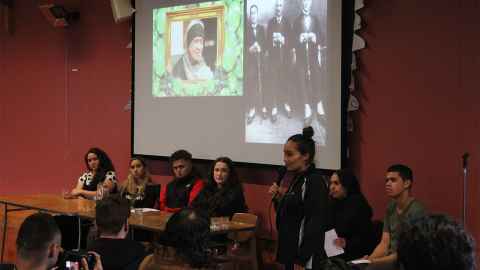Time to start taking our young activists seriously
8 October 2019
Opinion: As a sense of social responsibility grows among our young people, it would be very unwise to dismiss their contributions, writes Dr David Tokiharu Mayeda.

Universities are institutions where protests should feel natural. Here in Aotearoa, The Education Act (1989) requires that New Zealand universities accept a role as critic and conscience of society. So it is not just normal, it is expected that university students and staff openly question society’s norms, in particular those norms that reflect varying levels of discrimination.
We know from history that when university students openly confront discrimination, good things emerge. Where I am from – the United States – many of the country’s most significant social movements were sparked by university students. In 1960 during the Civil Rights Movement, sit-ins, wade-ins, and read-ins were inspired by a small group of courageous African American students from North Carolina Agricultural and Technical State University who demanded service at a whites-only lunch counter. These students were critical actors who helped end legal racial segregation.
And when students protest, they do much more than wave signs, chant slogans, and garner interest. First and foremost, they bring society’s attention to important issues. As we’ve seen recently, high school students are leading the charge as climate activists, helping to raise our collective consciousness on an issue characterised by decades of neglect. Protests also give those involved, many of whom feel marginalised in society, feelings of collective empowerment. And finally, protests open up pathways of communication to figures of authority, which are frequently obstructed by complicated institutional bureaucracy.
When I moved from Hawai‘i to Aotearoa in 2011, I recall student protests at the University of Auckland that were large and intense. Back then thousands of students blocked city streets and stormed through Auckland’s central business district protesting the incessant increases in student fees. One thing I noticed about these protests is that they were led predominantly by Pākehā men. And to an extent, this was fine. Those student leaders did their best to be inclusive and address matters in ways that spoke to a very diverse student body. But that was then, and this is 2019.
The Christchurch terrorist attacks on 15 March forced Aotearoa to confront the fact that racism not only exists in New Zealand in its most visceral form, but also that it had infiltrated our universities. University of Auckland students from ethnically diverse backgrounds began to organise, holding a hui in May to gather testimonies of on-campus racism, where they also urged university management to take action.
Then in July, the longstanding struggle at Ihumātao began receiving greater public attention. Māori students and their Pacific friends began supporting the cause, acting as kaitiaki of the whenua (protectors of the land), in some cases standing up to police, at times taking the “night shift” (spending the night on the whenua), enduring the cold elements of winter, sacrificing their studies.
I personally watched these students grow as they soaked in the mana displayed by Save Our Unique Landscape (SOUL), absorbed the strength of the whenua, connected their collective plight against colonialism across the Pacific, and realised their mana within. Almost entirely on their own with virtually no university support, these students brought SOUL’s principle leader, Pania Newton, to the University of Auckland, where she spoke to more than 250 attendees.
And then at the end of September, white supremacist propaganda once again resurfaced on the University of Auckland campus, trying to recruit “young white men who will assume the mantle of re-taking control of our own country”. When the university’s Vice-Chancellor elected not to remove the racist advertising, these same rangatahi rose. Networking with a range of student groups, students from Māori, Pacific, Asian, Middle Eastern, African and Pākehā backgrounds put aside their organisational differences and came together to challenge the Vice-Chancellor’s decision.
I know many of these students. They are some of our best students, not only because they take seriously a sense of social responsibility, but from an objective standpoint, they are extremely high-achieving in the classroom. As they continue to assert themselves (and they will), I would hope university management appreciates two things: first, they are demonstrating their tino rangatiritanga and leadership, and second, their ethnic diversity is a priceless resource. It would be very unwise to dismiss their contributions.
Dr David Tokiharu Mayeda is a senior lecturer in sociology and criminology in the Faculty of Arts.
This article reflects the opinion of the author and not necessarily the views of the University of Auckland.
Used with permission from Newsroom Time to start taking our young activists seriously 8 October 2019.
Media queries
Alison Sims | Research Communications Editor
DDI 09 923 4953
Mob 021 249 0089
Email alison.sims@auckland.ac.nz